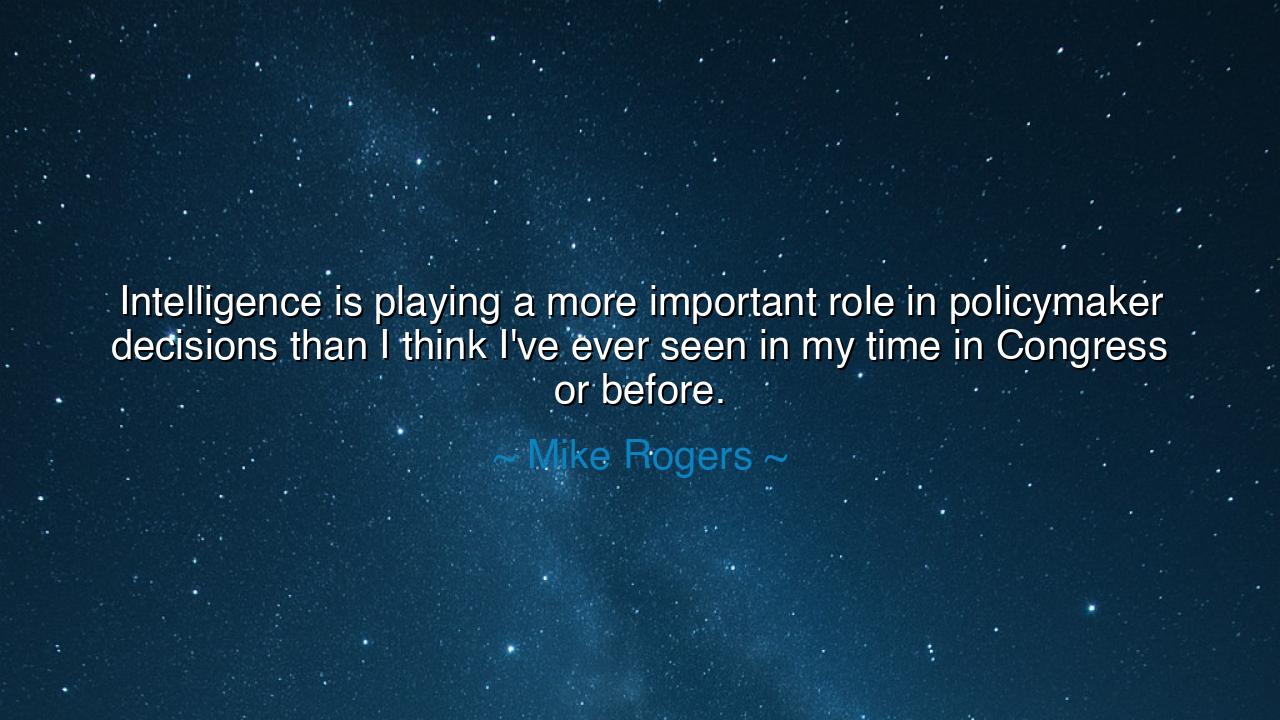
Intelligence is playing a more important role in policymaker
Intelligence is playing a more important role in policymaker decisions than I think I've ever seen in my time in Congress or before.






The words of Mike Rogers, spoken with the gravity of experience and the clear-eyed vision of a statesman, echo with both hope and warning: “Intelligence is playing a more important role in policymaker decisions than I think I’ve ever seen in my time in Congress or before.” In this reflection lies the voice of a man who has witnessed the shifting tides of governance, where knowledge, information, and insight have become the lifeblood of power. Rogers speaks not merely of political intelligence, but of the broader rise of information as destiny — the truth that in our age, it is not the sword, nor the wealth, nor even the crowd’s favor that determines the fate of nations, but the wisdom of what we know and how we use it.
From the dawn of civilization, leaders have depended on the counsel of those who could see what others could not. In the courts of the Pharaohs, scribes gathered whispers from distant lands. In the armies of the Greeks and Persians, scouts risked life and limb to bring back tidings of the enemy. Even the ancient Chinese strategist Sun Tzu taught that victory belongs not to the strongest, but to the one who “knows himself and knows his enemy.” Yet what was once gathered by a handful of spies and messengers is now drawn from oceans of data, from satellites in the heavens and sensors in the earth. Rogers’ words mark a new epoch in this eternal truth — an age in which intelligence, once the servant of rulers, has become the very foundation of governance itself.
But there is a dual meaning in his words, as there always is when men speak of knowledge. To say that intelligence now plays a greater role is to celebrate progress, but also to invite reflection on responsibility. For as intelligence grows in influence, so too grows the danger of overreliance — the peril of mistaking data for wisdom, and information for truth. The ancients understood this balance well. When the Oracle of Delphi spoke to King Croesus, she told him that if he attacked Persia, he would destroy a great empire. Blinded by arrogance, he assumed she meant the empire of his enemies. But it was his own that fell. Thus, even in the age of prophecy and mystery, knowledge required humility. Rogers’ insight reminds us that this ancient caution still holds — for the intelligence that guides policy must not be worshiped as infallible, but weighed, questioned, and tempered with judgment.
Consider the lessons of World War II, when intelligence, rightly used, turned the tide of destiny. The breaking of the Enigma code by Alan Turing and his team at Bletchley Park allowed the Allies to peer into the very heart of enemy communication. That knowledge — invisible, silent, but precise — saved countless lives and shortened the war. Yet even then, leaders like Churchill understood the burden of intelligence: to use it wisely, one must sometimes conceal it, sacrifice for it, and act with foresight rather than impulse. Intelligence, he said, is not knowledge alone but the ability to see the truth and use it without arrogance or fear. This is the spirit that Rogers invokes — a call to recognize intelligence as a tool of stewardship, not domination.
In our modern age, the scope of intelligence has expanded beyond warfare. It now shapes economic policy, health strategy, cybersecurity, and diplomacy. Leaders no longer govern by instinct alone; they govern by streams of data, analysis, and assessment. This, in itself, is a triumph of reason over chaos — the mark of a civilization that values evidence and foresight. Yet it also demands a new kind of wisdom — a moral intelligence to accompany the technical. For information without conscience can be as dangerous as ignorance with power. Rogers’ words invite us to ponder: as we gather more knowledge than any generation before us, will we also gain the wisdom to use it for good?
The meaning of his reflection, then, reaches beyond the corridors of government. It is a lesson for every individual who lives in this era of information. Each of us, in our own measure, is a policymaker now — deciding how to use what we know, what to share, what to believe. The intelligence revolution is not confined to nations; it lives in the minds of billions. And so the challenge that once faced kings now falls upon ordinary people: to discern truth from falsehood, to seek knowledge not for vanity, but for service.
Thus, the wisdom of Mike Rogers stands as both a testament and a warning. Intelligence must guide decision, but character must guide intelligence. A nation, like a person, is only as noble as the heart that wields its knowledge. To live wisely in this age, we must cultivate not only sharper minds but steadier souls. Let each person remember: knowledge is power, but wisdom is peace. Seek understanding, question what you hear, and use what you know to build, not to harm. For in the end, it is not intelligence itself that defines the destiny of the world — but the moral clarity with which we choose to use it.






AAdministratorAdministrator
Welcome, honored guests. Please leave a comment, we will respond soon